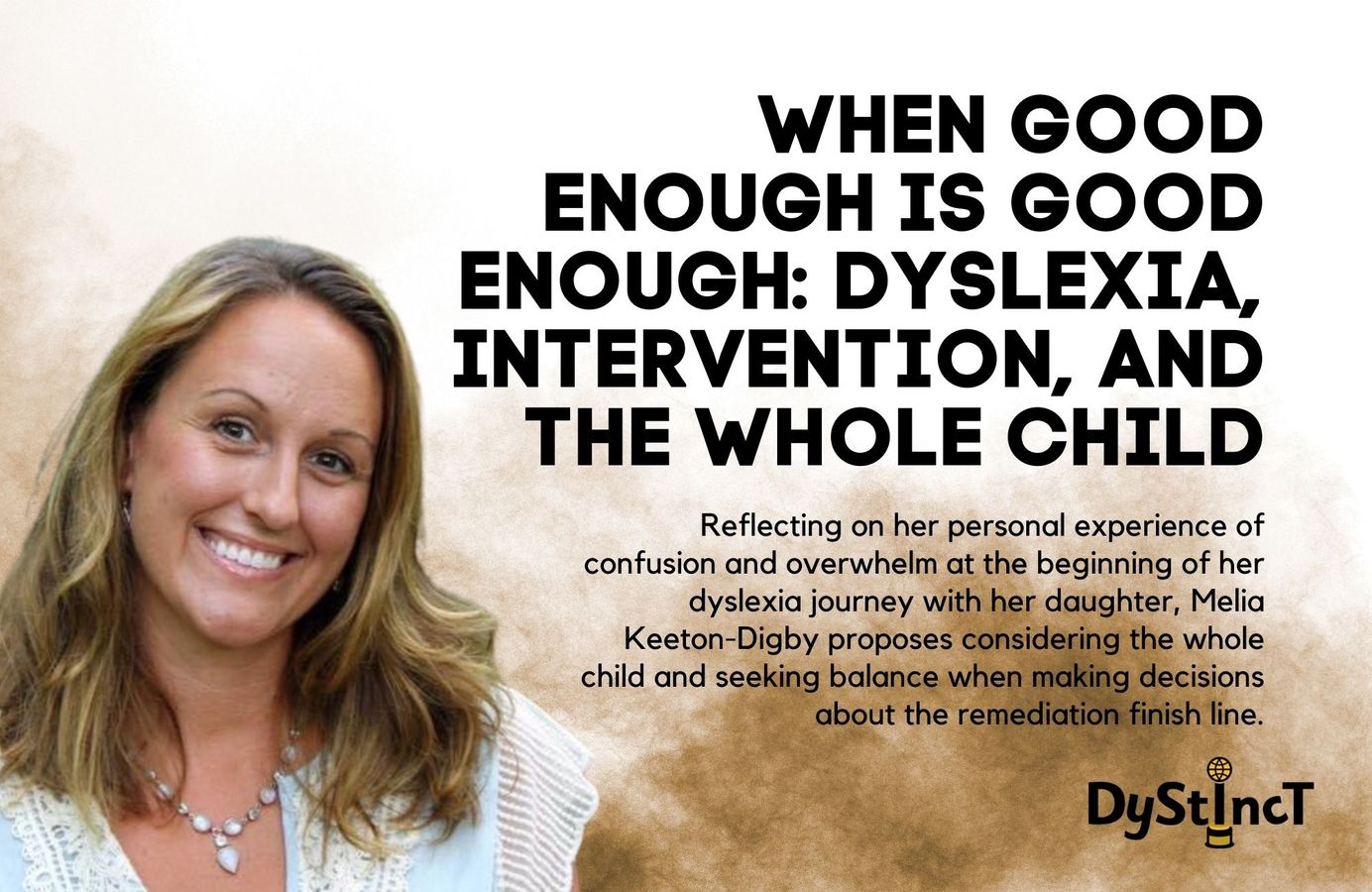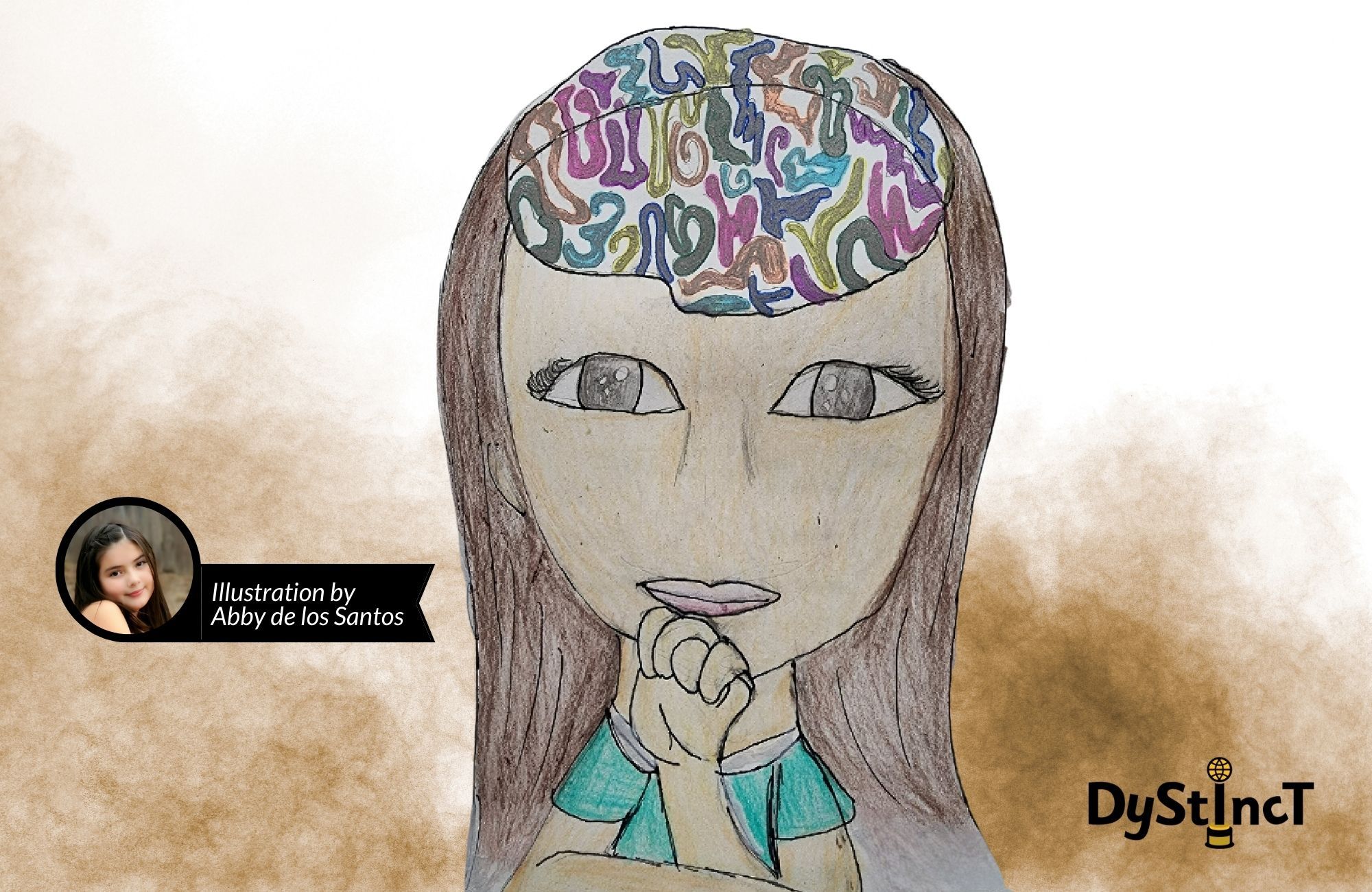
Issue 15: When Good Enough is Good Enough: Dyslexia, Intervention, and the Whole Child | Melia Keeton-Digby
Reflecting on her personal experience of confusion and overwhelm at the beginning of her dyslexia journey with her daughter, Melia Keeton-Digby proposes considering the whole child and seeking balance when making decisions about the remediation finish line.
I know something about you because you chose to read this article: you care about someone with dyslexia. If that someone is your beloved child, I also know something else about you: you have been through a lot.
Although the journey of raising a dyslexic child is unique for each family, some similarities invariably unite us. As a dyslexia specialist and mother to a daughter with dyslexia, I hear echoes of the same sentiments in each family's stories that I am privileged to hear. Feelings of sadness, grief, and perhaps worst of all, feelings of guilt pepper our stories, along with frustration and possibly anger at ourselves and others who "should have noticed the signs earlier." We have worried. Oh, how we have worried!

What will be the impact on my child's future? Will they be able to succeed in school? In life?
What will be the impact on my child's future? Will they be able to succeed in school? In life?
My experience watching my brilliant daughter struggle to learn to read and write was heartbreaking and all-consuming. Concern grew over the years and ultimately culminated in a moment forever imprinted in my mind's eye: me, sitting on the edge of an educational psychologist's office couch, flanked on either side by my husband and my sister, tears streaming down my face as I heard the word 'dyslexic' attached to my little girl's name. She was seven years old then, and finally, we had an explanation and, with it, hope. However, the relief I felt was brief and soon replaced with confusion over what to do next.
I recall sharing with my sister in those first few months post-diagnosis that it felt like I was walking a dark and arduous path alone and that I wished someone trustworthy and knowledgeable would come alongside me and light the way-Just tell me what to do, and I will do it. This confusion and overwhelm seem to be a universal experience for parents early on the dyslexia journey. Lacking the clarity, I desperately wished for, I dove headfirst into the dyslexia world and learned to be my own guide. I became my daughter's unwavering advocate and fought hard to obtain the resources she needed to succeed. With the right interventions and enough time and intensity, I watched my daughter bloom into the self-confident, self-advocating, successful learner she is today.
Those who see the light must carry the torch
Those who see the light must carry the torch
My work on behalf of my daughter naturally dovetailed over the years into community service, and I expanded my career as a speech-language pathologist to include Orton-Gillingham and dyslexia certificates. This work allows me to support dyslexic learners and their families with evidence-based intervention and advocacy. Through sharing my experience, I get to light the way for others behind us on the path. It is the honor of my life.
Dyslexia is only one part of our children, but it impacts all other aspects. Each day as I walk into my office, I pass by a decorative hanging mobile that my son and I made years ago, similar to the baby mobiles that hang over a crib. It consists of rods from which equally-weighted objects hang, taking advantage of the principle of equilibrium. Often it is just hanging there, perfectly still, and balanced, but if it gets even slightly bumped or jostled, the impact causes a reaction to not just one object but all others. Like the mobile, our children possess many interconnected dimensions – physical, emotional, mental, social, and spiritual – and any impact on one aspect of their lives will affect every other.
Undiagnosed and untreated, the weight of dyslexia wreaks havoc on the rest of the self.
Undiagnosed and untreated, the weight of dyslexia wreaks havoc on the rest of the self. Reading, writing, and spelling difficulties can lead to low self-esteem, frustration, and academic failure. Children with dyslexia often struggle with anxiety, depression, and social isolation due to their learning difficulties. "Dyslexia inflicts pain. It represents a major assault on self-esteem…For many affected children, dyslexia has extinguished the joys of childhood," writes Schaywitz in her seminal book, Overcoming Dyslexia. She continues, "Once a pattern of reading failure sets in, many children become defeated and develop what often evolves into a lifelong loss of their sense of self-worth." Using the mobile analogy, an undiagnosed and untreated dyslexic child filled with anguish is imbalanced. High-quality, evidence-based, and intensive intervention is essential to alleviate the emotional challenges and allow for academic success. Therefore, when you have a dyslexic child, dyslexia and its remediation often becomes a large part of your family's life- researching and learning about dyslexia, encouraging your child, advocating for their needs, educating teachers and administrators, fighting for their legal rights and making peace with compromises when we must, practicing skills, obtaining assistive technology, driving to appointments, paying for tutoring – all of this energy commensurate with the great need in our child, with the hopes of remediation and restoring equilibrium.
This post is for paying subscribers only
SubscribeAlready have an account? Log in


